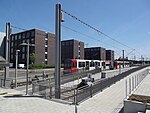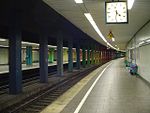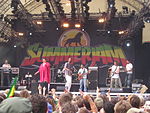Köln-Longerich station
North Rhine-Westphalia railway station stubsRailway stations in CologneRailway stations in Germany opened in 1855Rhine-Ruhr S-Bahn stationsRhine-Ruhr S-Bahn stubs ... and 1 more
S11 (Rhine-Ruhr S-Bahn)

Köln-Longerich is a railway station situated at Longerich, Cologne in western Germany. It is served by the S11 line of the Rhine-Ruhr S-Bahn.
Excerpt from the Wikipedia article Köln-Longerich station (License: CC BY-SA 3.0, Authors, Images).Köln-Longerich station
Volkhovener Weg, Cologne Longerich (Nippes)
Geographical coordinates (GPS) Address Nearby Places Show on map
Geographical coordinates (GPS)
| Latitude | Longitude |
|---|---|
| N 50.997777777778 ° | E 6.9016666666667 ° |
Address
Köln-Longerich
Volkhovener Weg
50739 Cologne, Longerich (Nippes)
North Rhine-Westphalia, Germany
Open on Google Maps










